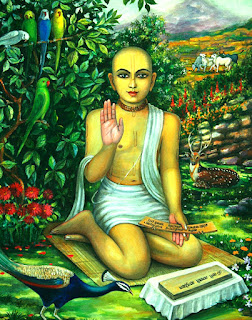VMA 1.75 Lament your misfortune if you cannot live in Vrindavan

Cross post from Vrindavan Today vṛndāraṇyam ananya-bhāva-madhurākārehito rādhikā- kṛṣṇa-krīḍita-rañjita-pravilasat-kuñjāvalī-mañjulam| yo’nyatrāpi kṛta-sthitir vidhi-vaśāc chocan sadā cintayen nityaṁ tan-milanaṁ vicinta yad ahaṁ tad-dhāma-yugmaṁ bhaje || He whose only desire takes the form of sweetness in exclusive love in Vrindavan, but by destiny is forced to live elsewhere, should lament his misfortune and always remember Vrindavan as a beautiful place with splendid groves where Radhika and Krishna enjoy their pastimes, and always meditating on their union, should think, "I am serving the Divine Couple." (1.75) Commentary The last three verses ( 1.72 , 1.73 , 1.74 ) have given instructions to those who cannot remain permanently in Vrindavan. Each of them emphasized service to the residents of Vrindavan, particularly those who are highly qualified association, fixed in bhajan of the Divine Couple of Vrindavan. Residence in the Dham is the ideal situation where...


